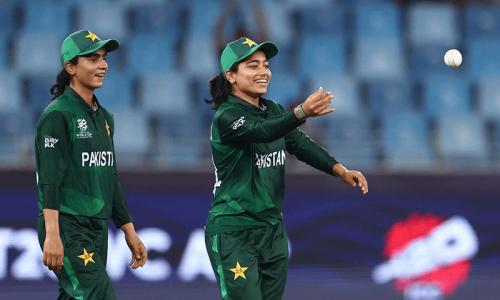Sultana Siddiqi’s career has come full circle; and in what an enviable way? Eleven years after directing her last TV play she has staged a successful comeback. Her new directorial venture "Zindagi Gulzar Hai", has won critical appreciation and enjoyed an unusually high viewership. What is no less remarkable is that whether she was working on the script or recording the 25 episodes, she did not take a breather from her responsibilities as the chairperson of Hum Network Ltd.
It’s heartening to note that she hasn’t lost her touch. Siddiqi’s innate sense of drama and her flair for depicting characters are very much in tact. But to be fair, she has always been the unofficial creative head of the network. Never short of ideas, she has taken part in brainstorming sessions with the programme producers, in the network as also in Moomal Productions, a banner, floated in the final days of her long association with the PTV.
In order to appreciate her multitasking abilities, one has to start from the very beginning. Siddiqi was born in a family of kazis (judges), settled in Hyderabad. She was seventh in a family of 10 children, where equal emphasis was laid on the education of boys and girls. Her mother, the guiding spirit behind the family, had studied up to seventh grade, which was no mean achievement for a small town woman in the 1930s. Her father worked for the municipality and their large mansion was an open house, where friends and relatives did not need permission to come and stay.
Like her siblings, Siddiqi studied in a government school, where Urdu and English were introduced in the fourth grade, until then the medium of instruction was Sindhi.
That was a sensible move and should please the growing number of educationists who believe that a child’s foundation should be laid in his (or her) first language.
Siddiqi was not particularly proficient in studies, but managed to clear her exams by studying shortly before the exams, a far cry from her studious sister and classmate Khursheed. Siddiqi was a tomboy. She would climb trees, challenge bullies and at times play truant. People who know her from those heady days say that she was the undisputed leader of kids in the neighbourhood. She was also a caring person and had a rich sense of humour, two qualities which she has retained in all these years.
Since she was a keen participant in co-curricular activities and brought laurels to her school, Siddiqi was quite a favourite of her teachers and the headmistress. She excelled in sports, debates, dramatics and dance. When the late Shehanshah of Iran’s royal consort Farah Diba was on a royal visit to Pakistan, she was selected to take part in a tableau which featured participants from different parts of the country. This was a part of the special show staged for the royal guest. Later, when Queen Elizabeth and Duke of Edinburgh were visiting Pakistan, Siddiqi was among the talented girls selected for presenting a song-and-dance number.
She was also a motivated Girl Guide and remembers the different places she and her colleagues camped in. “In those days it was quite safe for girls to stay even in God forsaken places,” she recalls ruefully.
By the time she went to college, Siddiqi had started taking interest in studies. She graduated with honours in comparative religion, but before she could have done her Master’s, she was married. That was in 1966 and it was the beginning of an unpleasant period in her life. The marriage didn’t work. She became a nerve-wreck and lost her self-confidence. Seven years later, accompanied with her three sons, she returned to her parents’ house.
Her family, particularly her elder brother Mazhar, gave her unflinching support. “I had decided that I would not just sit idle and waste my time. I wanted to make my life meaningful and become financially self-sufficient. I was determined to make a place for myself in the society and earn the respect of everyone, particularly my children,” mentions Siddiqi.
Her senior at the university Abdul Karim Baloch had by then become a television producer. He was aware of her talent and offered her the role of a talk show host. The Sindhi programme was aptly titled Satyun Sath (in the company of friends). Siddiqi thought of a provocative, and yet relevant, subject every week and introduced a number of first time participants from the ever-smiling Mahtab Rashdi, who later turned into a brilliant moderator herself, to the popular folk singer Mai Bhagi.
She portrayed the role of the daughter of Ghazala Rafiq and Qurban Jeelani (both sadly no more) in a television play, but didn’t accept any more acting assignment because as she maintains, “I wasn’t excited to see myself on the screen.”
Siddiqi didn’t join PTV on a full-time basis because for some time she had the feeling that her husband would have a patch up with her. But that didn’t happen. In the meanwhile posts of programme producers at the television corporation were advertised. It was again Baloch Sahib who convinced her to apply for a position. She did it on the last date of receiving applications. A written test and viva followed and she was selected. A rigorous 14-month on-the-job training ensued. That included, in the later stage, assisting Haroon Rind, one of her mentors, in the production of the popular Sindhi talk show, Roshan Tara. Later, she stewarded the programme all by herself.
Siddiqi’s first Urdu programme Rung Barung (1981) was a musical. It was for kids and attracted large viewership. The ditties were composed by Arshad Mahmud and rendered by Tina Sani. It got the young producer her first of the seven Best Production PTV awards.
Her first attempt in the realm of drama was Marvi, based on the legendary love story of Sindh. Sakina Sammoo played the title role and won as much applause as the serial and the producer did. Motivated by the success of the Sindhi serial, she asked the PTV bosses to let her present it in Urdu. The permission was given readily and the bilingual writer Noorul Huda Shah wrote an equally impressive script in the national language. Ghazal Siddiqi played Marvi and Mahnoor Baloch, another important character. All the three girls were her discoveries.
While on her knack of discovering talent, one may recall that it was Siddiqi who brought the inimitable singer Abida Perveen to the PTV studios. Abida was highly reluctant to face the camera but her husband supported the TV producer’s proposal. The singer often mentions that had she not appeared on the mini screen, she wouldn’t have enjoyed such massive popularity.
During all these years Siddiqi did not neglect her sons. She would try to reach her North Nazimabad residence before it got dark. She would keep track of their homework as also of the businesses she had invested her savings in. Shunaid, her eldest son, who was merely six when she left her husband’s house for good, was her biggest help.
Interestingly enough, it was after his wife Moomal that she named her production house. When she was signing a contract with PTV for the screening of her first independent venture, she was asked to give the name of her production company, she thought of Moomal’s name. Coincidentally, it’s her third daughter-in-law Momina who is running the organisation. And it is her husband, Duraid, once the baby of the family, who is helping his mother in managing the affairs of Hum Network Ltd.
Junaid, his second son, shuttles between Karachi and California, where his wife is an architect. Like his brothers, he too is into business.
Sultana Siddiqi doesn’t believe in micro-management but she is always there to help those she has delegated her responsibilities to. She is accessible and excels in man (also woman) management. All said, one is tempted to quote her sister Dr Khursheed, who says “Sultana is a role-model in a male-dominated society.”
















































